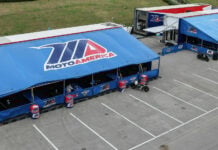One of a racing sanctioning body’s core missions is to make and enforce rules fairly and consistently, but over the past several years AMA Pro Racing has proved to be inconsistent when levying penalties on riders AMA officials say have broken the rules. Today, AMA Pro Racing announced that Jake Holden and Aaron Yates, the first- and second-place finishers in the final AMA Superstock race of the season at Laguna Seca, and Martin Cardenas, the third-place finisher in the final AMA Supersport race of the season, raced with illegal modifications to their motorcycles, specifically, that the PAIR anti-emission systems on their racebikes had been tied into the crankcase venting to reduce crankcase pressure. This modification prevents countershaft sprocket seals from blowing out and causing oil leaks by reducing crankcase pressure, but also reduces peak airbox pressure and thus the effectiveness of the ram-air system, resulting in a relatively small increase in horsepower. Holden, Yates and Cardenas were each fined $2000 and docked 20 Championship points, but they were allowed to keep their finishing positions. AMA officials claim that this penalty follows a precedent set by the previous AMA Pro Racing regime, which assessed a $2000/20-point penalty on Tommy Hayden (for illegal machining to the cylinder head and combustion chamber of his Superstock Kawasaki ZX-6R) in 2003 and on Ben Spies (for illegal intake modifications to his Suzuki GSX-R600) in 2002. Both Hayden and Spies were allowed to keep their finishing position. But last year, Josh Herrin was allowed to keep his third-place Supersport finish and was fined only $500 and docked only five points after he was ruled to have used an “illegal fairing” at Miller Motorsports Park. And in 2000, Chuck Chouinard was completely stripped of his second-place finish in the 750cc Supersport race at New Hampshire International Speedway because his tuner had cleaned his GSX-R750’s valves with Scotchbrite, which meant that “material was removed from the valves,” according to the AMA. Also at the recent AMA season finale at Laguna Seca, Shaun Summers and Morgan Murphy were each disqualified and suspended for six months from the date of their next license renewal for getting caught using over-displacement engines in Supersport (Summers) and Formula Xtreme (Murphy). Summers used a GSX-R750 engine in his Suzuki GSX-R600, and Murphy used GSX-R750 internals to boost the displacement of his GSX-R600, AMA officials said. But when Darren Luck was caught using a hybrid GSX-R600/750 engine in his Suzuki after finishing 10th in the Supersport race at Barber in 2003, he was fined $1000 and forfeited about $1200 in purse money, but was not disqualifed; the results archives on the official AMA website, amasuperbike.com, still list Luck as 10th in the 2003 Supersport race at Barber. (As a side note, Luck now says he had also modified the crankcase ventilation system, routing it through the PAIR valve, although AMA tech inspectors did not penalize him for doing so.) After Larry Pegram complained at VIR to AMA officials that Marty Craggill’s Formula Xtreme Ducati was using a lighter aftermarket frame with thinner-wall tubes and additional bracing, officials did nothing until the Thursday prior to the AMA National at Road Atlanta, when, according to AMA tech chief Kevin Crowther, they inspected the frame and told Craggill’s team that the frame was not legal. No penalties were assessed, and Craggill raced with a different frame and finished third on Saturday of the Road Atlanta weekend. And newly-crowned AMA Supersport Champion Roger Hayden told the media that he purposely ran competitor Chaz Davies off the track because he didn’t like the way he was riding during the Supersport race at California Speedway earlier this year. In spite of this being a clear violation of Rule 7.2. c.17. (Page 72 of the 2007 AMA Road Racing Rulebook) “Riding at any time in such a manner as to endanger the life or limb of other riders, officials or the public,” no disciplinary action was known to have been taken against Hayden. In other words, what action AMA officials take against any given rider or team for a claimed rules violation appears to either be completely inconsistent, or politically motivated, or both.
Updated: AMA Pro Racing Continues To Be Inconsistent In Assessing Penalties For Alleged Rules Violations
Updated: AMA Pro Racing Continues To Be Inconsistent In Assessing Penalties For Alleged Rules Violations
© 2007, Roadracing World Publishing, Inc. By David Swarts.






